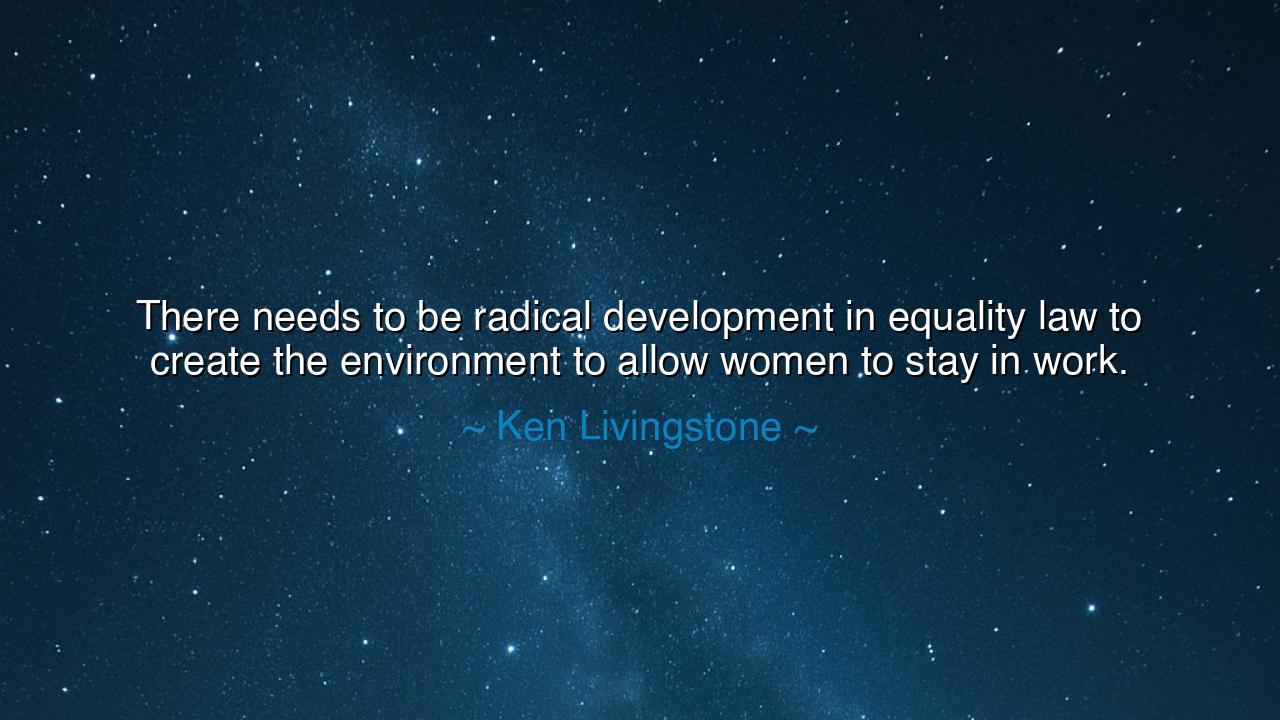
There needs to be radical development in equality law to create
There needs to be radical development in equality law to create the environment to allow women to stay in work.






In the words of Ken Livingstone, the call resounds across the ages: “There needs to be radical development in equality law to create the environment to allow women to stay in work.” This is not merely the cry of a politician; it is the lament and the hope of civilization itself. For in every age, the fate of women has mirrored the moral strength of the world around them. When laws are cold and unfeeling, when custom and labor are yoked to the will of the few, half of humanity is chained, and all of humanity stumbles.
In the ancient world, the walls of the polis were built by men, but the spirit that sustained them was borne by women. Yet their worth was hidden behind veils of silence and obedience. The great philosopher Hypatia of Alexandria, a woman of unmatched brilliance, was torn from life by those who feared the light of her mind. Her death was not merely a tragedy of the body but a symbol of the cost when equality is denied—when a society refuses to let its daughters rise and stay in their rightful place among the makers of history. Such tales remind us that law, if it is not just, becomes the handmaiden of oppression.
When Livingstone spoke of radical development, he summoned the courage of reformers who dared to remake the world. For true equality cannot grow from token gestures or half-hearted reforms. It must be radical—rooted in the recognition that every woman has the right to thrive not as an exception, but as a rule. It means transforming the soil in which society grows: the workplaces, the schools, the homes, and the laws that shape our daily lives. Only when the environment itself is changed can women stay in work—not as guests, but as builders of the realm.
Consider the story of Emmeline Pankhurst, who led the suffragettes in England with fire in her heart and iron in her will. She and her sisters faced prison, hunger strikes, and humiliation, yet they endured for a single truth—that women are not ornaments of the state, but its foundation. Their victory in securing the vote was monumental, but incomplete. For even a century later, the chains of inequality have not fallen entirely away. The battlefield has shifted—from the right to vote to the right to remain in work, to lead, to raise children without penalty, and to live without fear.
Livingstone’s quote is thus both warning and prophecy. He understood that equality laws are not static monuments—they must evolve as the world changes. The old structures of power reinvent themselves subtly, cloaking discrimination in polite words, unequal pay, and invisible expectations. To stand still is to fall backward. Therefore, reform must not be gentle; it must be radical, piercing through the inertia of comfort and the excuses of tradition.
The lesson is clear: if we wish to build a just world, we must not only speak of equality—we must craft it with our hands and defend it with our hearts. Every lawmaker, every leader, every worker must look upon the workplace as sacred ground where justice is measured not by words, but by the dignity it grants to all. The law should not merely permit women to stay—it should inspire them to flourish, unburdened by fear of loss, scorn, or sacrifice.
To all who hear these words: let your conscience be awake. Seek fairness not as charity, but as duty. Challenge the customs that dim another’s light. Support policies that protect mothers and fathers alike in the balance of labor and life. Demand transparency in wages, equality in opportunity, and compassion in law. For in the harmony of gender lies the health of nations.
And so, let this saying of Ken Livingstone echo like the voice of an elder beneath the stars: the development of equality is not the labor of a day—it is the great work of civilization. Each generation must chisel away at injustice, that the next may stand taller. Only then shall the world be whole—when no woman need choose between her work and her worth, and every soul may rise unafraid into the fullness of its purpose.






AAdministratorAdministrator
Welcome, honored guests. Please leave a comment, we will respond soon